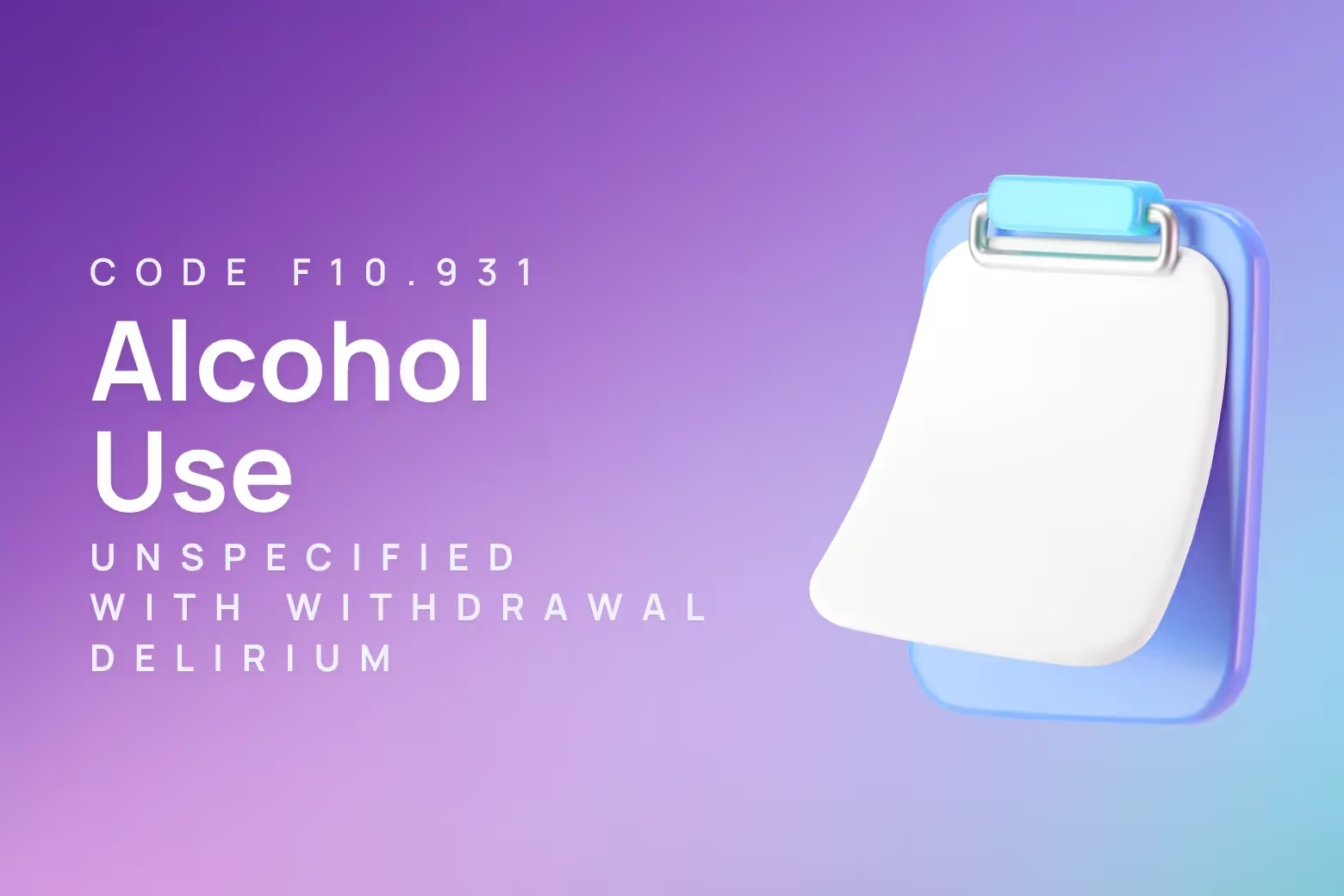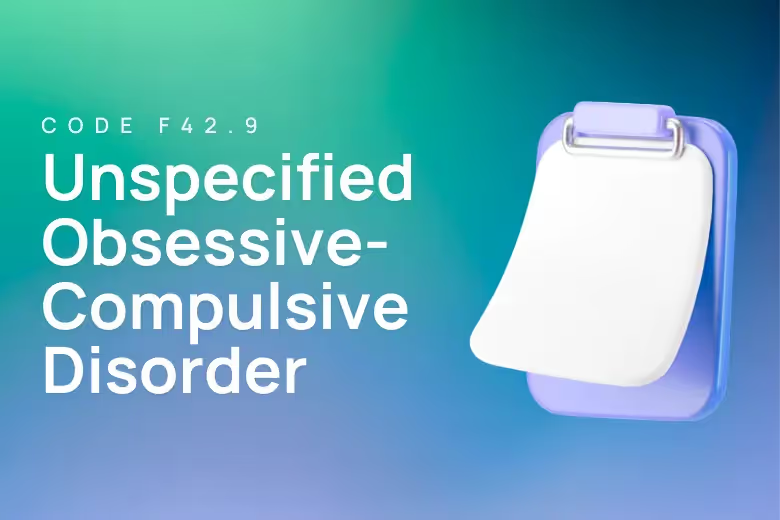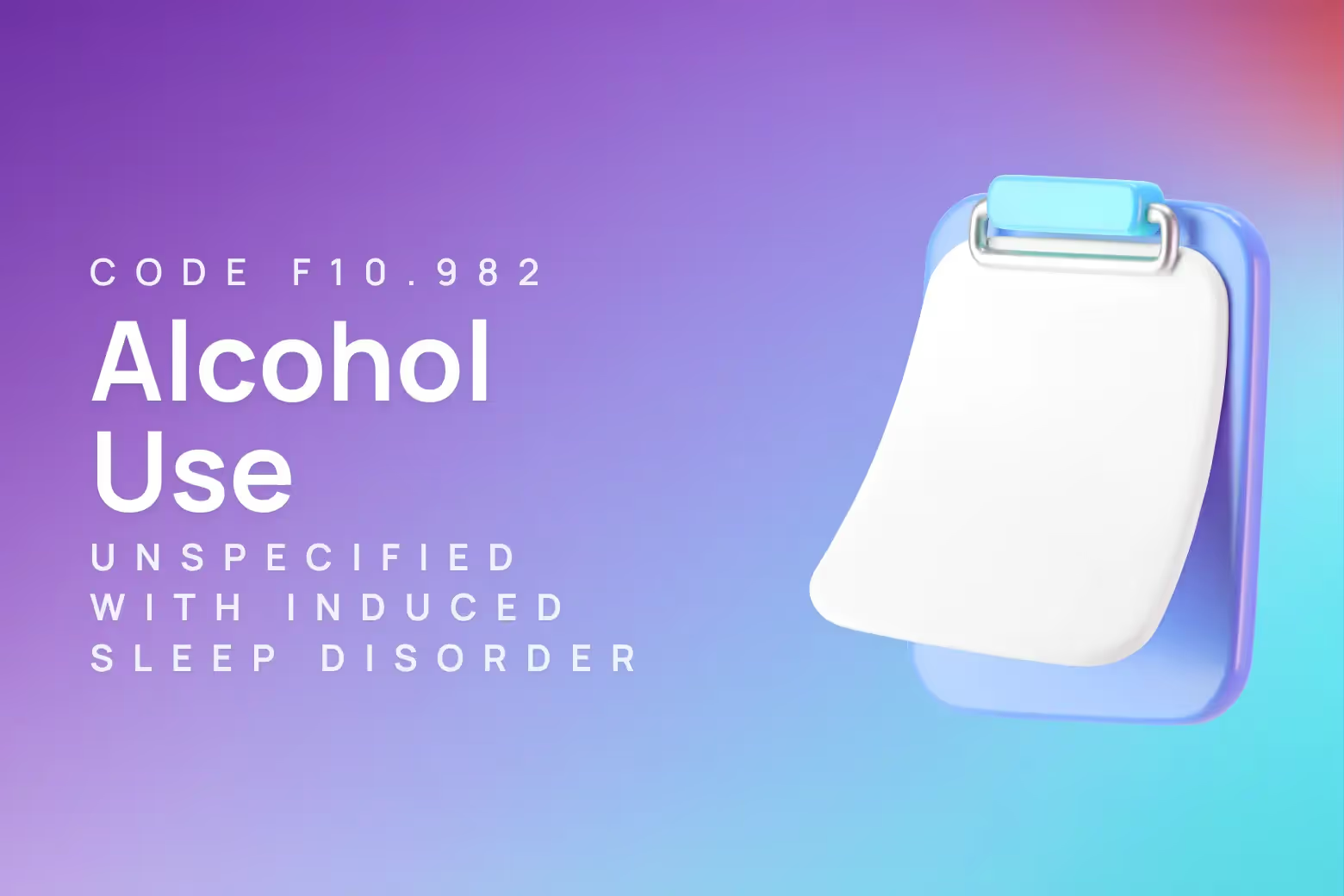ICD-10 code for alcohol use, unspecified with withdrawal, delirium

F10.931 is the ICD-10 code for alcohol use, unspecified with withdrawal, delirium.
This diagnosis applies when someone with alcohol use problems experiences withdrawal-related delirium, but the severity of their underlying alcohol use disorder is not specifically documented.
Accurate diagnosis of alcohol withdrawal delirium is critical due to its potential for severe complications and mortality without proper medical management.
Key features:
- Medical emergency requiring immediate hospitalization and close monitoring
- Disturbance in attention, awareness, and cognition developing over hours to days
- Typically occurs 2-3 days after cessation of alcohol consumption
- Associated with significant autonomic hyperactivity and fluctuating consciousness

Diagnostic criteria for alcohol withdrawal delirium (F10.931)
Alcohol withdrawal delirium, commonly known as delirium tremens, represents the most severe form of alcohol withdrawal syndrome.
The condition develops when individuals with chronic alcohol dependence suddenly reduce or cease their alcohol intake.
Clinical presentation includes profound disturbances in consciousness characterized by reduced ability to direct, focus, sustain, and shift attention combined with decreased orientation to the environment.
These disturbances develop rapidly, typically within hours to several days, and demonstrate significant fluctuation in severity throughout the day.
Essential diagnostic requirements include:
- Disturbance in attention and awareness that represents a clear change from baseline
- Additional cognitive impairment affecting memory, orientation, language, visuospatial ability, or perception
- Evidence that symptoms result directly from alcohol withdrawal rather than another medical condition
- Symptoms not explained by pre-existing neurocognitive disorders or severe reduction in arousal level
The delirium typically emerges within 48 to 72 hours following alcohol cessation and usually persists for 2 to 3 days, though severe cases may continue for several weeks.
Associated features frequently include autonomic hyperactivity manifested by hyperthermia, rapid heart rate, elevated blood pressure, and excessive sweating.
When to use F10.931 diagnosis code
Proper differential diagnosis ensures accurate coding and appropriate treatment planning. Understanding when to apply F10.931 versus related codes prevents documentation errors and supports optimal patient care.
F10.931 vs F10.930 (Alcohol use, unspecified with withdrawal, uncomplicated)
F10.930 applies when patients experience typical alcohol withdrawal symptoms without delirium or other major complications. These individuals may have tremors, anxiety, nausea, sweating, and sleep disturbances, but maintain clear consciousness and cognitive function.
F10.931 is reserved for cases where delirium accompanies withdrawal, indicating severe impairment in attention, awareness, and cognition that fluctuates throughout the day.
F10.931 vs F10.932 (Alcohol use, unspecified with withdrawal, with perceptual disturbance)
F10.932 describes alcohol withdrawal complicated by hallucinations or other perceptual disturbances without the broader cognitive and consciousness impairments seen in delirium.
Patients with F10.932 typically maintain clear orientation and awareness despite experiencing visual, auditory, or tactile hallucinations.
F10.931 encompasses more comprehensive cognitive dysfunction beyond isolated perceptual disturbances, including disorientation, attention deficits, and fluctuating consciousness levels.
F10.931 vs F10.939 (Alcohol use, unspecified with withdrawal, unspecified)
F10.939 serves as a general code when alcohol withdrawal is present but specific complications are not documented or identified. This code lacks the specificity required for cases involving delirium.
F10.931 should be used when delirium is clearly documented and represents the primary complication of alcohol withdrawal.
Related ICD-10 codes
Related codes within the F10.93 family include:
- F10.93 - Alcohol use, unspecified with withdrawal
- F10.930 - Alcohol use, unspecified with withdrawal, uncomplicated
- F10.932 - Alcohol use, unspecified with withdrawal, with perceptual disturbance
- F10.939 - Alcohol use, unspecified with withdrawal, unspecified
Additional relevant codes from the broader F10 category encompass various alcohol-related disorders including intoxication, dependence, and induced mental disorders with different severity specifiers.
Interventions and CPT codes for alcohol withdrawal delirium
Alcohol withdrawal delirium requires intensive medical management in hospital settings with multiple treatment modalities. Each intervention corresponds to specific billing codes for proper reimbursement.
Medical stabilization and monitoring
Initial psychiatric diagnostic evaluation using CPT 90791 establishes the diagnosis, assesses medical complications, and develops comprehensive treatment plans. This intensive assessment examines the patient's alcohol use history, medical status, and withdrawal severity.
Continuous medical monitoring in hospital settings focuses on vital sign assessment, neurological evaluation, and management of complications. Close supervision prevents patient injury from confusion, agitation, or wandering behavior.
Pharmacological interventions
Benzodiazepines represent first-line treatment for alcohol withdrawal delirium, with diazepam being the preferred medication due to its rapid onset and long duration of action. Treatment aims to achieve light sedation where patients remain responsive but tend to fall asleep unless stimulated.
Antipsychotic medications serve as adjunctive treatment when patients experience severe agitation or distressing hallucinations. These medications should never be used alone, as they do not prevent seizures and may lower seizure threshold.
Psychotherapy and family interventions
Individual psychotherapy using CPT 90834 or 90837 addresses underlying alcohol use patterns once the acute withdrawal episode resolves. Sessions typically utilize motivational interviewing, cognitive-behavioral approaches, or relapse prevention strategies.
Family psychotherapy (CPT 90846/90847) helps relatives understand addiction dynamics, develop coping strategies, and establish supportive environments for recovery. Family involvement proves crucial for long-term treatment success.
Group psychotherapy (CPT 90853) provides peer support and shared learning experiences through structured group sessions focused on relapse prevention and recovery skills development.
How Upheal improves F10.931 ICD-10 documentation
Clinical documentation platforms can significantly improve the accuracy and efficiency of alcohol withdrawal delirium diagnosis and treatment planning.
Suggesting appropriate ICD-10 codes based on session content
Documentation platforms analyze clinical notes and symptom descriptions to recommend relevant diagnostic codes.
For alcohol withdrawal delirium cases, the system can identify key indicators like attention disturbances, cognitive impairment, and withdrawal timing to suggest F10.931 rather than less specific codes.
This feature reduces coding errors and ensures proper specificity when documenting complex withdrawal presentations that involve multiple symptoms and complications.
Maintaining HIPAA-compliant records with proper diagnostic coding
Secure documentation systems ensure that sensitive alcohol-related diagnoses remain protected while maintaining accurate clinical records.
Proper coding supports insurance authorization for intensive medical treatments required during withdrawal delirium episodes.
Automated backup systems and access controls protect patient privacy while ensuring that essential treatment information remains available to authorized healthcare providers during critical care periods.
Reducing administrative burden so you can focus on client care
Streamlined documentation workflows allow clinicians to spend more time providing direct patient care during medical emergencies like alcohol withdrawal delirium. Template-based notes capture essential clinical information without requiring extensive manual entry.
Integration with billing systems ensures that complex treatment episodes involving multiple interventions are properly coded and submitted for reimbursement, reducing administrative delays that could impact treatment continuity.
Supporting clients with alcohol withdrawal delirium
Alcohol withdrawal delirium represents a medical emergency requiring immediate hospitalization and intensive monitoring.
Treatment success depends on rapid recognition, appropriate medication management, and comprehensive supportive care addressing both physical and psychological needs.
Environmental modifications prove essential during treatment.
Patients benefit from quiet rooms with minimal sensory stimulation, good lighting, and environmental cues like clocks and calendars to reduce disorientation.
One-to-one supervision may be necessary to prevent injury from wandering or falls.
The clinical approach emphasizes rapid symptom control to prevent complications while addressing underlying alcohol dependence.
Benzodiazepine loading achieves initial stabilization, followed by gradual dose reduction as symptoms improve. Thiamine supplementation prevents Wernicke's encephalopathy, while fluid and electrolyte management corrects common imbalances.
Healthcare providers using comprehensive documentation platforms can improve diagnostic accuracy, reduce administrative burden, and focus more attention on direct patient care during these critical treatment episodes.
Try Upheal's clinical documentation platform to experience how intelligent code suggestions and streamlined workflows can support better outcomes for clients with complex alcohol-related conditions.













